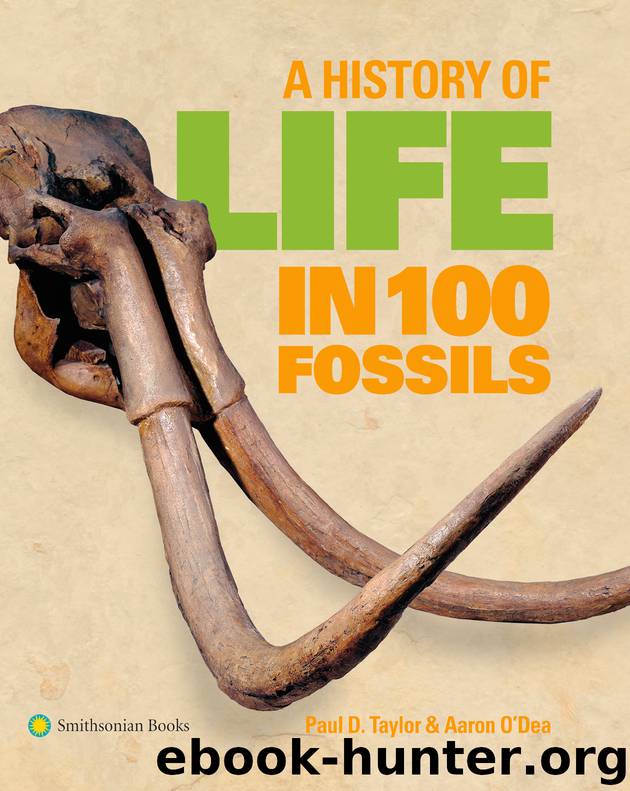A History of Life in 100 Fossils by Paul D. Taylor Aaron O'Dea

Author:Paul D. Taylor,Aaron O'Dea [Taylor, Paul D.]
Language: eng
Format: epub
ISBN: 978-1-58834-502-8
Publisher: Random House Publisher Services
Published: 2014-10-14T04:00:00+00:00
Losing a skeleton
octopus
OCTOPUSES ARE PECULIAR CREATURES. With their large eyes and head seemingly capable of accommodating an oversized brain, these molluscs resemble humanoid aliens from a science fiction film. The eight writhing, sucker-bearing arms, coupled with an ability to change colour to fit in with the background, add further to the ‘other worldliness’ of these animals.
As octopuses lack a mineralized skeleton, it is not surprising that they are uncommon in the fossil record. Some primitive octopuses do, however, possess a tough organic internal shell called a gladius, which is occasionally fossilized. But the octopus fossils that provide us with the most information are some exceptional examples preserving soft tissues. The specimen of Palaeoctopus newboldi shown here is just such a fossil. It was collected by the soldier and traveller Lieutenant Thomas Newbold (1807–1850), after whom the fossil was subsequently named, in the Lebanon around the middle of the nineteenth century. Not much more than the outline of the animal is visible, but this is sufficient to show that Palaeoctopus had eight arms. The arms have suckers, like all modern octopuses, but there are also indications of fins on the outside of the body, structures that are comparatively rare in octopuses living today. Unfortunately, a fossil fish is superimposed over part of the body of Palaeoctopus, slightly obscuring our view of the octopus.
Palaeoctopus was collected from rocks of Late Cretaceous age. Until quite recently it was the oldest octopus known in the fossil record. Examples of other fossil octopuses of roughly the same age (100 million years), or slightly older, have since been identified. There is even a disputed fossil octopus from Carboniferous rocks over 300 million years old, but this fossil has 10 tentacles and may not be a true octopus.
Octopus evolution bucks the common trend for marine animals to evolve thicker skeletons through time. Instead, octopuses show a progressive loss of the skeleton. This parallels a change in lifestyle, from squid-like ancestors that swam continuously at varying levels above the seabed, to fully fledged octopuses that spend much of their time on the seabed concealed in crevices, where the hard shell becomes a hinderance, and swimming only occasionally.
Download
This site does not store any files on its server. We only index and link to content provided by other sites. Please contact the content providers to delete copyright contents if any and email us, we'll remove relevant links or contents immediately.
Sapiens: A Brief History of Humankind by Yuval Noah Harari(14368)
The Tidewater Tales by John Barth(12651)
Mastermind: How to Think Like Sherlock Holmes by Maria Konnikova(7323)
Do No Harm Stories of Life, Death and Brain Surgery by Henry Marsh(6938)
The Thirst by Nesbo Jo(6932)
Why We Sleep: Unlocking the Power of Sleep and Dreams by Matthew Walker(6706)
Life 3.0: Being Human in the Age of Artificial Intelligence by Tegmark Max(5547)
Sapiens by Yuval Noah Harari(5366)
The Body: A Guide for Occupants by Bill Bryson(5080)
The Longevity Diet by Valter Longo(5058)
The Rules Do Not Apply by Ariel Levy(4957)
The Immortal Life of Henrietta Lacks by Rebecca Skloot(4576)
Animal Frequency by Melissa Alvarez(4461)
Why We Sleep by Matthew Walker(4434)
The Hacking of the American Mind by Robert H. Lustig(4375)
Yoga Anatomy by Kaminoff Leslie(4358)
All Creatures Great and Small by James Herriot(4311)
Double Down (Diary of a Wimpy Kid Book 11) by Jeff Kinney(4261)
Embedded Programming with Modern C++ Cookbook by Igor Viarheichyk(4173)
